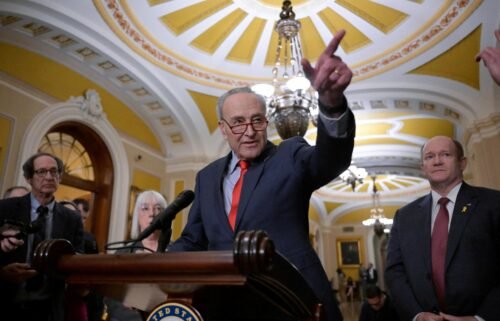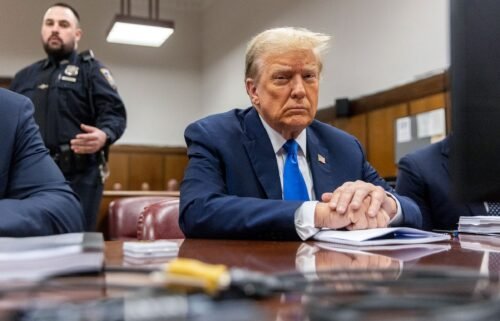A month-by-month look at Donald Trump’s top lies of 2019

A defining feature of the Donald Trump presidency is the bombardment of lies — Trump’s unceasing campaign to convince people of things that aren’t true.
Trump made more than 2,700 false claims this year. (We’re still calculating the final total.) Some of them were innocent slips, some of them little exaggerations. But a large number of them were whoppers: deliberate, significant attempts to deceive and manipulate.
The breadth of the dishonesty was as striking as the frequency. Trump was inaccurate this year about every conceivable topic, from his dealings with Ukraine to the size of his crowds to, literally, the time of day.
He told too many lies for us to confidently pick a single most notable lie of the year. So we’ve picked our 12 most notable, one for every month. (We’re defining notable as some combination of egregious, important and bizarre.)
January: Duct tape and the border
Trump has long seemed to relish reciting lurid stories about the horrors of illegal immigration. During a barrage of immigration-related false claims in January, as he sought public support for the government shutdown over funding for his border wall, he came up with a vivid new tale about the logistics of human trafficking.
“And they’ll have women taped — their mouths with duct tape, with electrical tape. They tape their face, their hair, their hands behind their back, their legs. They put them in the backseat of cars and vans, and they go — they don’t come in through your port of entry because you’d see them. You couldn’t do that,” he said during a January 14 speech to the American Farm Bureau Federation. “They come in through our border, where we don’t have any barriers or walls.”
While it’s possible some women are being made to suffer such kidnapping horrors, the policy premise of Trump’s “duct tape” novellas — that trafficking victims are never transported through legal ports of entry, only through the unprotected desert — is not at all true.
February: Imaginary voter fraud
Trump has depicted himself as a crusader against election fraud. What happened in February was telling.
On February 21, North Carolina’s elections board ordered a new congressional election in the state’s ninth district because of an actual case of apparent election fraud — allegedly perpetrated by a Republican operative who was indicted the following week. On February 22, Trump was asked for his thoughts and he quickly pivoted to imaginary election fraud in another state.
“Well, I condemn any election fraud,” he said. “And when I look at what’s happened in California with the votes, when I look at what happened — as you know, there was just a case where they found a million fraudulent votes…”
Trump’s lying is rarely challenged in real time. This time, a reporter did try to object to the fiction about California. Trump responded with a favorite tactic: an aggressive “Excuse me, excuse me” interjection, then more dishonesty.
March: Revisionist history on “Russia, if you’re listening”
Nearly three years after Trump made his infamous “Russia, if you’re listening” campaign request for help obtaining deleted Hillary Clinton emails, he announced a new explanation.
He had been just kidding. The media had failed to report that he had been just kidding.
“Because with the fake news — if you tell a joke, if you’re sarcastic, if you’re having fun with the audience, if you’re on live television with millions of people and 25,000 people in an arena, and if you say something like, ‘Russia, please, if you can, get us Hillary Clinton’s emails. Please, Russia, please. Please get us the emails. Please!’… So everybody is having a good time. I’m laughing, we’re all having fun. And then that fake CNN and others say, ‘He asked Russia to go get the emails. Horrible.’ …These people are sick,” he told the Conservative Political Action Conference on March 2.
No, Trump didn’t make the request before 25,000 people at a rollicking arena event. No, he wasn’t laughing at the time.
Trump made his plea at a 2016 press conference, with a straight face. He offered no indication that he was anything less than serious.
This was up-is-down fake history, one of Trump’s periodic efforts to rewrite a reality we were all able to witness.
April: “Windmills” and cancer
Trump, who has tilted at windmills for more than a decade, made perhaps his strangest claim on the subject at a National Republican Congressional Committee fundraiser on April 2.
“Wind. If you — if you have a windmill anywhere near your house, congratulations, your house just went down 75% in value. And they say the noise causes cancer,” he said.
There might indeed be a “they” Trump has heard saying that wind turbines — which he habitually calls “windmills” — cause cancer. That should not mean the President should pass on their false claim to the country. But Trump is not only a serial liar but a serial sharer of inaccurate information he has heard from a motley collection of dubious sources — “many people,” “some people,” “they” — and not bothered to verify.
May: Two lies in one
Trump has been lying about Veterans Choice since 2018, falsely claiming he was the one who got it passed. His rendition on May 30, along with a similar claim in March, might have been the most egregious.
“I disagree with John McCain on the way he handled the vets, because I said you got to get Choice. He was never able to get Choice. I got Choice,” Trump told reporters.
This was a double lie. In addition to taking his usual unearned credit for a program that President Barack Obama signed into law in 2014, Trump used his non-accomplishment as a cudgel against a deceased foe whose accomplishment it really was. McCain, in fact, was a key author of the Choice bill.
What Trump signed in 2018 was the VA MISSION Act, a law that expanded and modified the Choice program. The full name of the VA MISSION Act honors McCain: it is the John S. McCain III, Daniel K. Akaka, and Samuel R. Johnson VA Maintaining Internal Systems and Strengthening Integrated Outside Networks Act of 2018.
June: Remains, no longer returning
Trump had a real diplomatic success to boast about in 2018. North Korea had returned the remains of some of the American soldiers who were killed in the Korean War.
In 2019, as the diplomacy soured, North Korea ceased cooperating. Trump’s solution: lie that North Korea was still cooperating, thus giving false hope to hundreds of American families.
“We’ve had, as you know, the remains of the heroes, our great heroes from many years ago — that’s coming back, and coming back as they find them, as they find the sites and the graves, and they’re sending them back,” he told reporters on June 25, just five days before he met with dictator Kim Jong Un at the Korean Demilitarized Zone (DMZ).
We thought at first that it was possible Trump just didn’t know what was going on, since the Pentagon had only announced the suspension of the program in May. But, in mid-June, Trump was told by an interviewer that “the remains have stopped coming back.”
He responded, “But they will be. Look, we’ve gotten remains back. That will start up again.” He then continued speaking as if it had not stopped at all.
July: Smearing Rep. Ilhan Omar
There just aren’t many lies you can tell about a Muslim politician that are more incendiary than a lie that they’d said al Qaeda makes them proud. But here’s what Trump said about Democratic Rep. Ilhan Omar at a North Carolina campaign rally on July 17, wrongly describing remarks she had made in a 2013 interview: “Omar laughed that Americans speak of al Qaeda in a menacing tone and remarked that, ‘You don’t say America with this intensity. You say al Qaeda — makes you proud. Al Qaeda makes you proud. You don’t speak that way about America.'”
Trump continued his smear campaign against the Minnesota congresswoman later the same week, falsely claiming that Omar had used the phrase “evil Jews.” In September, he shared a Twitter video that falsely claimed Omar had been dancing in celebration on the anniversary of the 9/11 terrorist attacks.
August: A tariff mantra
Between July 8, when we started counting Trump’s false claims at CNN, and December 15, the day until which we currently have comprehensive data, Trump’s most frequent false claim of any kind was that China is paying the entirety of the cost of his tariffs on imported Chinese products.
“We’re not paying for the tariffs; China is paying for the tariffs, for the 100th time,” he told reporters in one typical remark on August 18. “And I understand tariffs very well. Other countries, it may be that if I do things with other countries — but in the case of China, China is eating the tariffs, at least so far.”
His assertion has been contradicted by numerous tariff-paying American companies and by multiple economic studies. But Trump said it on 49 separate occasions over those five months. And he said it 20 times in August alone, more than he did in any other month, as he faced scrutiny over his intensifying trade war.
September: The Sharpie fiasco
This credibility disaster would have been a one-day story if Trump had just acknowledged that his initial tweet was a mistake — that, as the National Weather Service office in Birmingham, Alabama tweeted soon afterward, Alabama was not thought to be at greater risk from Hurricane Dorian than initially thought.
Trump preferred to lie than to admit error. His thoroughly deceitful multi-day effort to convince people that he had never been wrong about Alabama culminated in one of the most revealing images of the Trump era: the President of the United States displaying a Sharpie-altered map, which we could all see had been Sharpie-altered, as supposed evidence in his favor.
We counted 12 false claims from Trump on Dorian and Alabama over 11 days. Not including the Sharpie map.
October: Inverting reality on the whistleblower
The Sharpie madness was old news by the end of September. Trump’s dealings with Ukraine, and Democrats’ related impeachment push, were his most frequent subject of dishonesty in all four weeks of October.
His most frequent individual false claim on Ukraine or impeachment was that the whistleblower who complained about his dealings with Ukraine was highly inaccurate. He said this on 46 separate occasions through December 15.
“They heard a whistleblower who came out with a false story — you know, people say, ‘Oh, it was always fairly close.’ It wasn’t close at all. What the whistleblower said bore no relationship to what the call was,” he said in one representative comment on October 9.
What did the whistleblower get wrong? Trump never explained in detail. He couldn’t have: the whistleblower’s primary allegations were proven correct, several of them by the rough transcript Trump himself released. But Trump just kept repeating his “false story” mantra over and over — banking, as usual, on his ability to turn a lie into gospel among his supporters no matter how many times fact-checkers debunked it.
Trump first made a version of this claim at the end of September, but he repeated it on 30 separate occasions in October alone as Democrats moved toward impeachment. That was 17 more times than he uttered any other individual false claim that month.
November: Pulling “out” of Syria
Trump has to be egregiously inaccurate to get fact-checked by Fox News morning show “Fox & Friends,” but his November 22 lie about the troops qualified. When Trump claimed he had “just pulled out of Syria,” co-host Brian Kilmeade responded, “You have 600 guys there, right?” (The military had said at the time that perhaps 600 troops would remain in northeast Syria, plus another 100-plus troops in southern Syria.)
What Trump had decided in October, after a phone call with Turkish President Recep Tayyip Erdoğan, was both to withdraw US troops from a Kurdish-held part of Syria that Turkey wanted to invade and to deploy US troops to protect oil fields in eastern Syria. The net result was a decline in the US troop presence in Syria, but — as Kilmeade of all people noted — not an actual pullout from the country.
Trump’s claim on Fox & Friends was not a one-time slip. In October, when there were still about 1,000 soldiers in Syria, Trump said, “Look, we have no soldiers in Syria. We’ve won. We’ve beat ISIS. And we’ve beat them badly and decisively. We have no soldiers.”
December: Dishwashers
The President of the United States said this: “Dishwashers — we did the dishwasher, right? You press it — remember the dishwasher, you’d press it, boom, there’d be like an explosion, five minutes later you open it up, the steam pours out, the dishes. Now, you press it 12 times. Women tell me. Again, you know, they give you four drops of water. And they’re in places where there’s so much water, they don’t know what to do with it. So we just came out with a reg on dishwashers — we’re going back to you. By the way, by the time they press it 10 times, you spend more on water — and electric! Don’t forget. The whole thing is worse because you’re spending all that money on electric. So we’re bringing back standards that are great.”
Trump’s nonsense-rambling about home appliances lends itself to dismissive mockery, but it’s worth taking it seriously. This was the President using two not-even-close-to-true premises — that modern dishwashers require 10 or 12 button-presses to start and that modern dishwashers use more water and electricity than older dishwashers — to justify a deregulation push that will do damage to the environment.




